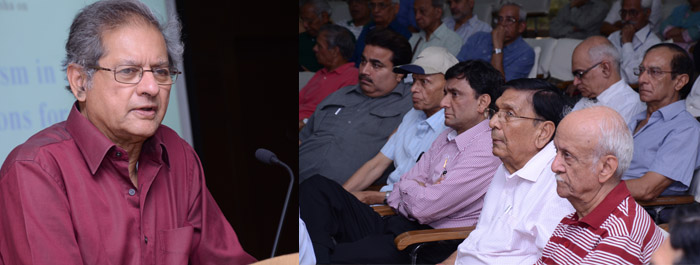On 28th May 2013, VIF organized Vimarsha, where eminent author and columnist Hiranmay Karlekar delivered an enlightening lecture on “Islamic Radicalism in South Asia – Implications for India”. The session was chaired by Ajit Doval, KC, Director VIF, who succinctly summed up various dimensions of the subject that were to be addressed.
Karlekar began his talk by assessing the long term strategy of organizations such as Al Qaeda. Analyzing their psyche and doctrine, He emphasized that their strategy will be to strengthen their control, firstly, in the Middle East and in Northern Africa, following which they will target entire Africa and Europe. He also highlighted that Al Qaeda would attempt to spread and diffuse their bases of operations, making its containment and elimination further difficult. A vital part of their doctrine, as Karlekar underlined, is Islamic Radicalization. He examined various factions in the Islamic society and argued that the hardliners have the tendency to reassert on the rest and dictate terms. Radicalization has been an effective tool of the hardliners and has been utilized well so far.

Considering the case of South Asia, the veteran author stressed that the times ahead are going to be challenging for India. Pakistan continues to export terrorism and it is unclear who or what represents Pakistan, their Government, their Army or the ISI, for us to assess whether or not there has been a change in Pakistan. Afghanistan faces tough days ahead with the withdrawal of the Western forces. Karlekar predicted that it could well be a repeat of 1989-91, where the civilian government would valiantly fight the Taliban, but eventually succumb to radical forces, due to insufficient financial assistance given by foreign powers.
Bangladesh, Karlekar argued, currently has one of the strongest leaders in Sheikh Hasina as its Prime Minister who can fight off radicalization. She is also very important for India in the fight against Islamic radicalism and India must do its best to strengthen her government before the early 2014 national elections to ensure that hardliners are kept at bay.
The session was concluded with a brief round of Q&A.







